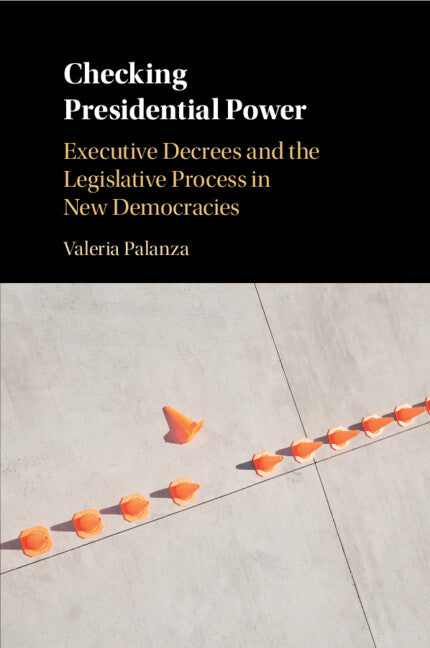Freshly Printed - allow 8 days lead
Couldn't load pickup availability
Checking Presidential Power
Executive Decrees and the Legislative Process in New Democracies
Provides the first comparative look into executive decree authority. It explains why presidents issue decrees and why checks and balances sometimes fail.
Valeria Palanza (Author)
9781108446631, Cambridge University Press
Paperback / softback, published 14 April 2022
265 pages, 26 b/w illus. 31 tables
22.8 x 15.2 x 1.5 cm, 0.4 kg
'In her groundbreaking book, Palanza (Pontificia Universidad de Chile) examines policy making in separation of powers systems by explaining the levels of reliance on executive decrees that may lead to unbalanced presidential systems and ultimately low democratic quality. The author accurately defends the long-held belief that policy enacted by decree is less stable than policy enacted by the widely supported congressional statutes.' K. M. Zaarour, Choice
A central concern about the robustness of democratic rule in new democracies is the concentration of power in the executive branch and the potential this creates for abuse. This concern is felt particularly with regard to the concentration of legislative power. Checking Presidential Power explains the levels of reliance on executive decrees in a comparative perspective. Building on the idea of institutional commitment, which affects the enforcement of decision-making rules, Palanza describes the degree to which countries rely on executive decree authority as more reliance may lead to unbalanced presidential systems and will ultimately affect democratic quality. Breaking new ground by both theorizing and empirically analyzing decree authority from a comparative perspective, this book examines policy making in separation of powers systems. It explains the choice between decrees and statutes, and why legislators are sometimes profoundly engaged in the legislative process and yet other times entirely withdrawn from it.
1. Introduction: a choice of paths behind each policy
2. Decrees versus statutes: choice of legislative paths in separation of powers systems
3. Institutions and institutional commitment
4. Reinstatement of congressional decision rights: Brazil
5. A corollary of low levels of institutional commitment: Argentina
6. The choice of legislative paths in comparative perspective
7. Conclusions: rules, institutional commitment, and checks on presidents.
Subject Areas: Legislation [LNZL], Judicial review [LNDM], Government powers [LNDH], Political structures: democracy [JPHV], Constitution: government & the state [JPHC], Comparative politics [JPB]


